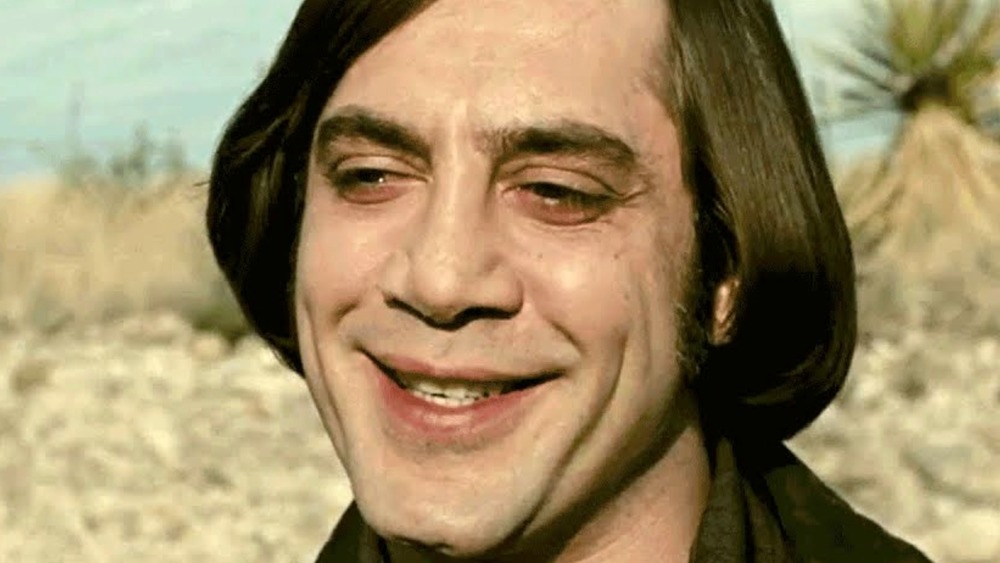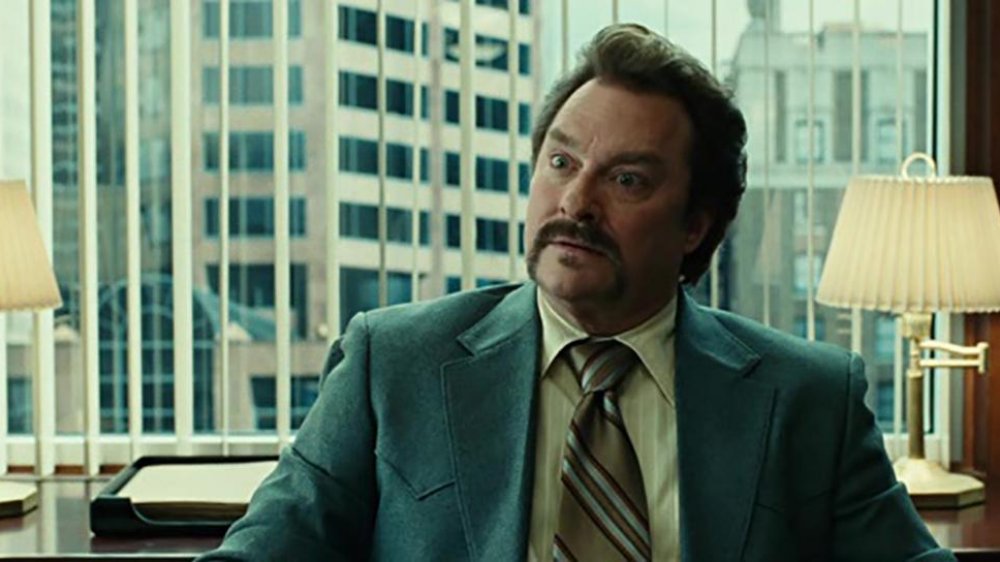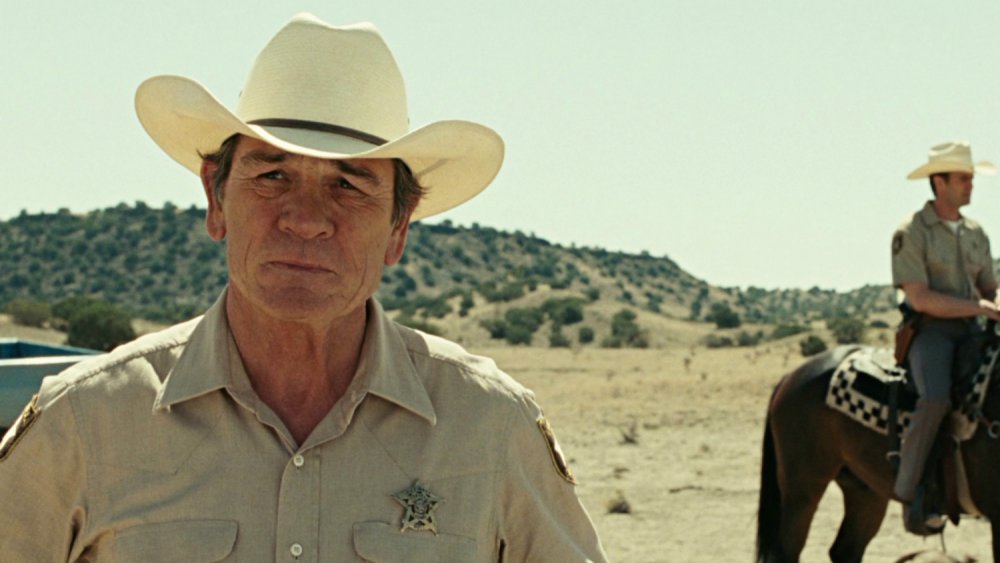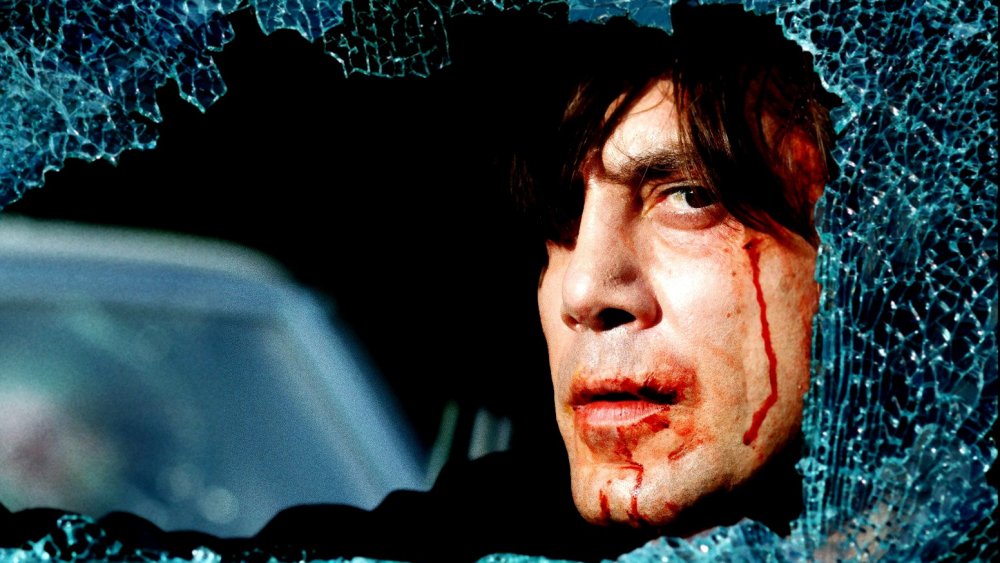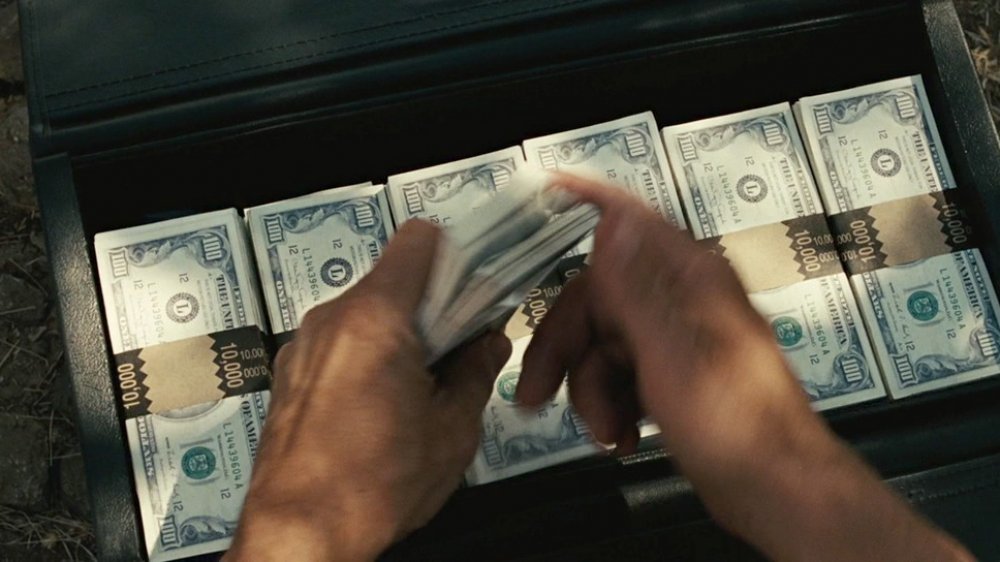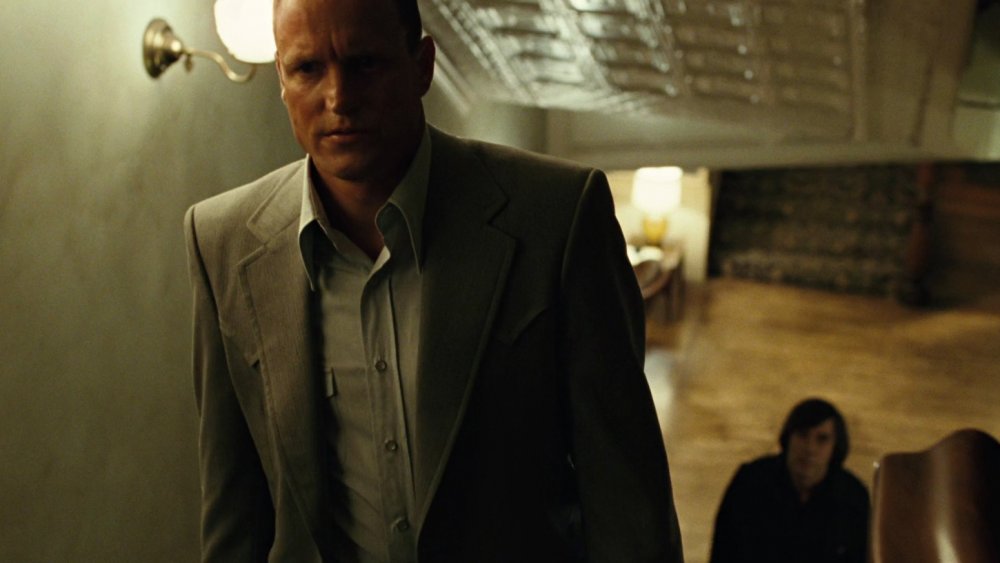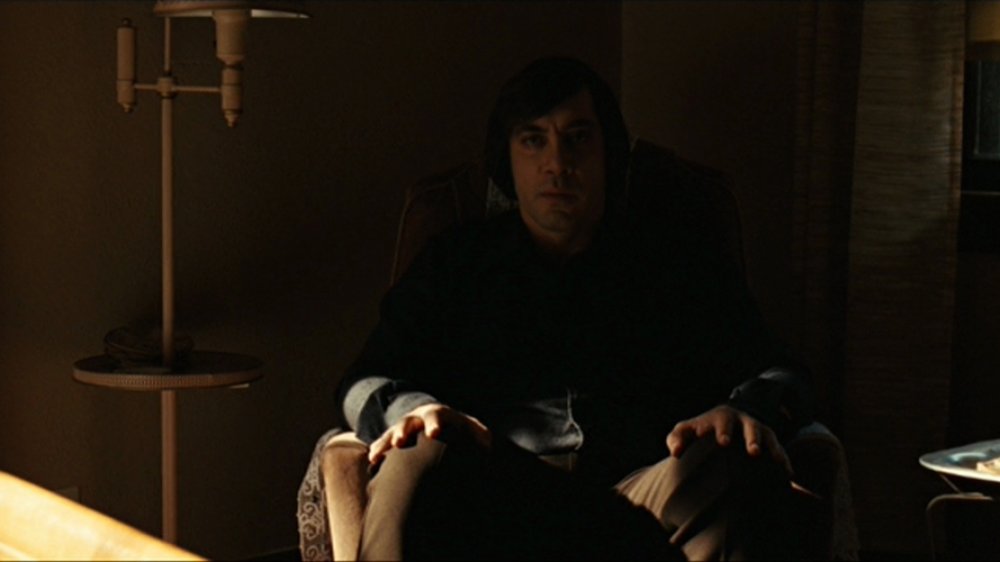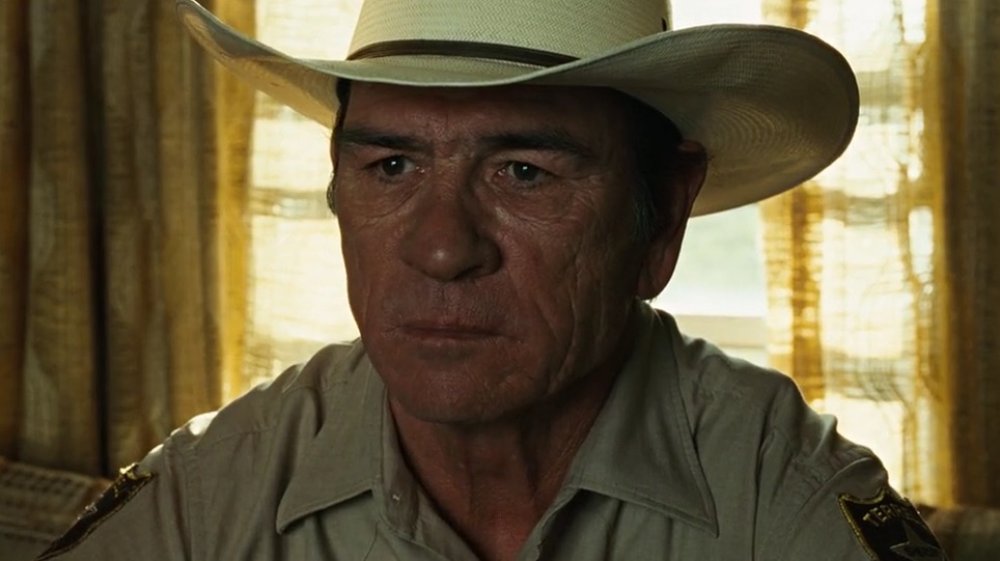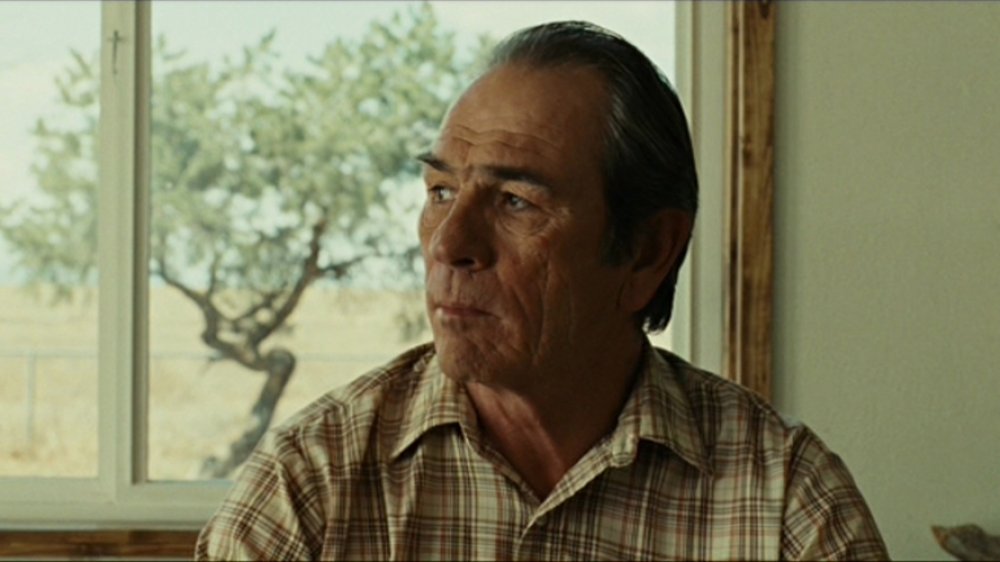The Ending Of No Country For Old Men Explained
In 2007, writer/director duo Joel and Ethan Coen released No Country for Old Men, an adaptation of Cormac McCarthy's celebrated novel of the same name. It quickly became heralded as one of the best pieces of work in their already stellar career, earning numerous accolades, including the 2008 Academy Award for Best Picture. In recent years, retrospective viewers have dubbed the film one of the best to come out of the 2000s. It's no wonder movie-watchers flock to it to this day, whether they're die-hard Coen fans or cinematic newbies.
No Country for Old Men is, in many ways, a straightforward crime drama. It follows a man who stumbles onto a drug deal gone bad and tries to get away with a case full of money as a hitman and a sheriff both pursue him. As the film goes on, though, various ambiguities emerge, culminating in an ending fans are still dissecting to this day. With that in mind, this is the ending of No Country for Old Men, explained.
Mexican fallout
The catalyst for the events of No Country for Old Men comes when Llewelyn Moss stumbles upon the aftermath of a shootout in Texas while out poaching. Llewelyn finds and takes a satchel full of money from the shootout site. The story that follows is very tightly focused on just a few people caught up in the chaos that unfolds, which means we never really learn that much about who was at the shootout and why everything went bad.
What we do know, based on the discussions major characters have about the shootout, is that it involved two major criminal organizations, one based in Mexico and the other based in the United States. While the film does briefly move south of the border, most of it unfolds from the American perspective, so we don't know which cartel or other group was moving the drugs across the border in the first place. They seem to have recouped their product to sell it again, but other than that, their future is unclear. There won't be a sequel to No Country for Old Men, but if there was, it might focus on the future of the Mexican cartel and its drug supply, what they plan to do with it, and how they might retaliate against their counterparts on the other side of the border.
Texas fallout
Viewers know the Mexican half of the drug deal went badly wrong, but it's clear from the events of the film that the other side may be much worse off by the time the dust settles. On the American side, the organization attempting to buy the drugs has neither the drugs they wanted nor the money they planned to spend after Llewelyn made off with it, putting them in a bind from the beginning. Then, to make matters worse, Anton Chigurh launches his own reign of terror against them that seems to go all the way up to the top.
We don't know if the man who sends hitman Carson Wells to go after Chigurh and recover the money was at the very top of the organization, but he was clearly a key part of the leadership, and by the end of the film he too is dead. It's possible there's now a headless criminal enterprise in Texas trying to scatter to avoid law enforcement, or regroup and continue operating. We don't get to see the full fallout here, either, but it won't be pretty.
The next sheriff
Much of No Country for Old Men follows Sheriff Ed Tom Bell as he becomes increasingly concerned about his place in the world as an aging lawman, heir to a family legacy of Texas law enforcement. The deeper Bell gets into the situation involving Moss, Chigurh, the drug deal gone bad, and the missing money, the more concerned he is about the future. At one point he flat-out says that he just feels "overmatched," and worries that the violence around him is escalating in a way he can't contend with. He notes that many lawmen in his area used to go without even carrying guns, and now that feels outdated.
By the end of the film, Ed Tom is retired, his sense of law and order upended by the Moss affair, which means someone else now has to follow in his footsteps and become the next sheriff. Whether that's his deputy Wendell or someone else, Bell will no doubt have some standing in his community as a kind of elder statesman. He's not just going to hole up in his house and never talk to anyone, so we're left to wonder: Now that his state of mind is forever changed, how will he react when the next sheriff comes asking for advice? Will he have any wisdom to share, or does he feel that era is past for him?
Chigurh's fate
For much of No Country for Old Men, hitman Anton Chigurh feels like an unstoppable killing machine. Even after Moss manages to shoot him during the firefight in Eagle Pass, Chigurh is still able to calmly and methodically stage an explosion that allows him to rob a pharmacy, then patch himself up with frightening efficiency and care. By the end of the film we feel that even if other characters manage to hurt him, they can't stop him.
But Chigurh is brought low in the final minutes, not by a bullet, but by a car accident that breaks his arm and leaves him bloodied and hobbled in the middle of an Odessa neighborhood. When we last see him, Chigurh has just bribed a group of boys to keep their mouths shut — but do we really believe they'll never tell a soul? Is this accident the thing that finally makes Chigurh vulnerable enough to be brought down, or will he simply set his own arm and live to kill another day? The car accident seems to be the only thing that truly rattles him in the whole film, so it's hard to tell.
The case full of money
The MacGuffin at the center of No Country for Old Men is a satchel containing more than $2 million originally meant to purchase a pickup truck full of drugs. We watch as the money changes hands from the dead drug dealers to Llewelyn Moss, and then finally end up with Anton Chigurh, who takes it from Moss' hotel room after killing him.
So, what happens to the money after that? We know that a tracking device was placed in it from the very beginning to keep tabs on its whereabouts, but Moss destroyed that. We also know that Chigurh was still able to hunt Moss down without the tracker, and Chigurh didn't exactly disappear quietly. Will his surviving former employers still manage to track him down, or will Chigurh use the money just enough to make himself disappear? If anyone can manage to hide himself and $2 million in plain sight, it's probably Anton Chigurh.
Other killers
Midway through the film, desperate to track down Chigurh and reclaim the money he stole after killing two of his associates, a man in an office building hires Carson Wells to seek out Moss and get the money back before Chigurh can. Wells, a savvy contract killer in his own right, is familiar enough with Chigurh to know how dangerous he is, and smart enough to try to get to the money without directly involving his colleague. Chigurh finds him anyway, and kills him on principle.
If the organization that hired Wells is still trying to track down Chigurh and the money after the film ends, there's a good chance they'll be seeking out other hired killers, and possibly sending more than one in a kind of competition to see who can finally bag Chigurh. It's easy to imagine each of these men trying different approaches, and it's also easy to imagine Chigurh killing every single one of them, but perhaps if the organization goes through enough contract killers, they can wear Chigurh down.
The coin toss
In attempting to describe Anton Chigurh to Llewelyn Moss, Carson Wells says that he has "principles that transcend money or drugs or anything like that." We see these principles come into play in very specific ways twice in the film, when Chigurh pulls out a coin and asks his victim to call the toss. The first time he does this, with a gas station attendant, he plays a game of chance for the man's life because the man pried into his business. The man wins the toss and survives.
The second time Chigurh makes use of a coin toss he's with Moss' wife, Carla Jean, but when he asks her to call the toss she refuses. In a fascinating insight into Chigurh's mind, we watch as he demands over and over again that she call the toss, and still Carla Jean refuses. She insists that the coin has nothing to do with it, and Chigurh responds "I got here the same way the coin did."
The world as Chigurh sees it is something he needs to impose some form of order on. He believes in rules, to the point that he can only let fate decide things so much before it starts to drive him mad. His final words to Carla Jean are evidence that something in his past, perhaps some event beyond his control, shaped him in a profound way, and molded him into the instrument of order he now tries to be.
"You can't stop what's coming"
Near the end of the film, after he's found Llewelyn Moss dead and realized that the money is missing, Ed Tom Bell returns home to visit his uncle, a former lawman living in seclusion in a ramshackle house. Over the course of their conversation Ed Tom makes it clear that he feels he can't contend with the modern class of criminal. He feels like the world has passed him by, crime has grown too rampant, and there's no room in law enforcement for a quiet old man like him.
Ellis responds with a certain degree of sympathy, but also tells him about a horrific crime from decades earlier that, while not quite on par with the massive drug shootout at the beginning of the film, still reminds Ed Tom that violence is nothing new. The world is a dark place, particularly if you devote your life to fighting on the side of the light. Ed Tom's uncle reminds him that "you can't stop what's coming," implying that all he can do is his best. Ed Tom seems to concede this point, but also feels the time is right to retire. The scene is a perfect encapsulation of the film's meditation on how violence preys upon the soul, and a reminder to the audience that it's not always the world that changes, but us.
Ed Tom's dream
No Country for Old Men is known for a great many things, but it's perhaps best known for its ambiguous final scene. Ed Tom Bell sits at his dining room table and tells his wife about a dream he had. In the dream, he and his father are riding on horseback through the night, and his father rides ahead of him carrying fire in a horn. Ed Tom is visibly anxious when describing the dream, and notes that his father was wordless, with his head down, as he rode ahead of him to make a fire. Ed Tom concludes by saying that he knew his father would be waiting up ahead, having made a fire in "all that cold and all that dark." With this, the dream and the film both end, leaving some viewers scratching their heads.
In the context of the rest of the film, as Ed Tom reckons with his place in a world he feels has passed him by, the dream feels like the conclusion of a man who knows that death is the next milestone. He's already retired from the profession that his father did before him, his father's been dead for years, and so his subconscious is telling him that a reunion in the afterlife seems to lie ahead. But of course, Ed Tom did wake from the dream, which means perhaps he has a little bit of living left to do before that happens.
